Guest Post by Eric Peters
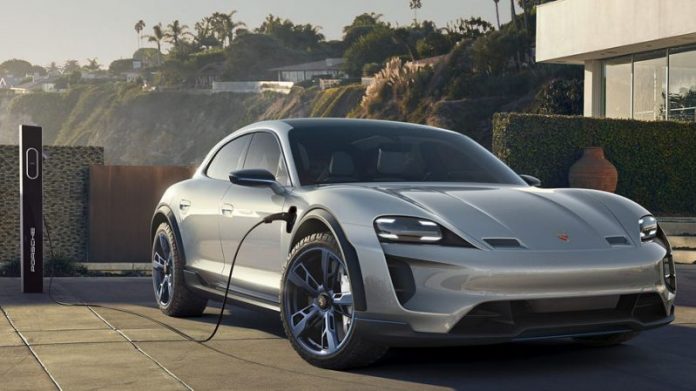
Porsches have never been inexpensive – but they’re about to become more so. You could call it the electric surtax – because that’s what it amounts to.
And it’s probably going to be applied to us all, eventually.
Porsche corporate – the company – just announced that it will expect all 190 of its U.S. stores to install high-voltage fast chargers at a cost of $300,000-$400,000 per store as part of the company’s “commitment” to “electrify” half its product portfolio by 2025.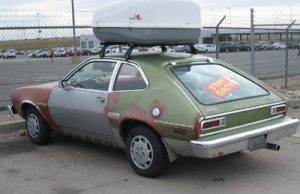
The problem – which Porsche openly concedes – is that while electric Porsches are fast, they’re slower than a ’72 Pinto with a slipping transmission when it comes to recharging.
This is a problem with all electric cars, not just Porsches.
It’s a much bigger problem, arguably, than battery range.
But it magnifies that problem.
Electric cars can’t go as far as gas-engined cars, even very thirsty ones. A 911 Turbo averages about 20 MPG (19 city, 24 highway) but it can still go between 340 and 429 miles (city/highway) on a full tank – which is at least 100-150 miles farther than the longest-legged electric car currently on the market, a Tesla S.
And the range touted by Tesla and other EV advocates should always be taken with two big spoonfuls of salt – because it’s much more variable than the range of a gas-engined car. For example, electric cars are more affected by heat – and cold – in part because power-using accessories such as AC and heat are powered by electricity and take a lot of electricity to power. Use these accessories and your range decreases.
Electric batteries also lose efficiency in extremely cold weather – just like the 12V battery that starts a gas-engined car. But once a gas-engined car is running, cold weather doesn’t affect its range – even if the heat is used – because the heat is created as a byproduct of the running engine .
But even if an electric car’s range exactly matched its gas-engined equivalent, there is still the problem of recharging these things.
And “fast” chargers aren’t going to solve it – because they’re not.
Not unless people can be sold on the idea that a minimum 30-45 minute pit stop for a partial recharge is “fast.” That’s the fastest you can recharge – and only partially – at a “fast” charger, because that’s the amount of time required by physics and chemistry to safely put a partial charge back into an electric car’s battery pack.
Most EVs have lithium ion or nickel metal hydride batteries – as opposed to lead acid – but the principle behind the time needed to safely recharge them is the same as it is for any other battery, including the 12V batteries we use to start our non-electric cars and for that matter, the 18V batteries used in our cordless power tools.
An electric car’s battery pack isn’t just an empty container into which electricity can be pumped. When you plug in, electricity is metered into the battery’s cells, where chemical reactions take place that cannot be rushed without risking permanent and expensive damage to the battery pack.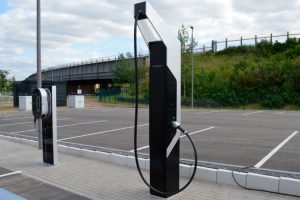
This is why it takes 30-45 minutes or longer to “fast” charge an electric car – and it’s also why electric car batteries can’t be fully recharged at “fast” chargers.
Just like the 12V battery in your car and the batteries that power cordless tools, fully recharging requires slow charging. Several hours, at least.
Gas, on the other hand, is liquid power. It is portable and immediately transferrable. When you fill your gas tank, you’re not re-charging it. You are merely re-filling an empty container.
This can be done in about five minutes. Not partially, either.
It is very difficult to visualize more than a small percentage of the driving public willingly giving up the convenience of being able to fully refuel their vehicle in about 5 minutes in exchange for an electric car that takes 30-45 minutes to partially recharge. And which requires recharging more often than a gas-engined car needs to be refueled – because it can only be partially recharged at these “fast” chargers – which multiplies the inconvenience.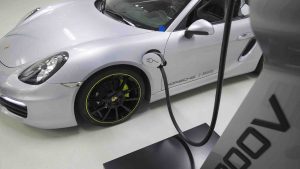
Yes, it can be done at home – or at your Porsche store. Or anywhere else there are “fast” chargers available. But you’ll still have to wait those 30-45 minutes, unless a way is found to end-run physics and chemistry. And you’ll probably be doing it several times a week, too – vs. once a week to refuel your gas-engined car. Road trips will take longer; everything will take longer.
Pity the marketing and sales people whose job it will be to sell this to the public as progress. Their job will be not unlike trying to convince people that flying from New York to LA in a piston-engined DC3 over the course of 18 hours – with a couple or three stops along the way – is preferable to hopping on a 757 for a non-stop four-hour flight.
Oh, and there’s the surtax for these “fast” chargers.
The Porsche stores – which like most dealerships are independently owned franchises – aren’t going to just absorb the $300,000-$400,000 it will cost them to post these “fast” chargers at their stores. They will fold the cost into what they charge customers – and the same is going to happen generally.
For this electric car thing to even conceivably operate on a mass scale, “fast” chargers will need to become at least as common as gas stations are now. More common, actually – because more “fast” chargers will be needed because it takes so much more time to “fast” charge an electric car.
A single gas pump can fully refuel nine cars in 45 minutes. A “fast” charger can partially recharge one car in the same time. Put another way, it will take nine “fast” chargers to do the job of one gas pump – and then only partially.
This will get into money as well as time.
The money will have to come from somewhere.
Either it will have to be folded into the price of the electric car itself – as Porsche seems bent on doing. Or it will be done via new taxes on electricity or miles driven or some other mechanism.
These taxes will probably make current motor fuels taxes seem like chump change, given we are talking not merely about erecting an entirely new infrastructure system on a national scale but one that will have to have a much larger footprint than the current infrastructure for gassing up cars.
Where will the physical space come from for all these “fast” chargers? Where will the additional capacity come from to power them all?
We know one thing. It will come out of our pockets to pay for it all.


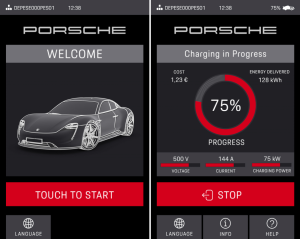


Since carbon dioxide has nothing to do with global warming or global cooling, what is the agenda driving this move to expensive and inefficient electric cars? Is this just another step in destroying our freedom of movement and herding us into buses and soul-destroying anthills, better known as high-rise condos/apartments, while bankrupting us in the process? The agenda is clearly to create slave colonies now called cities controlled by those who rule over us. Check out the UN’s Agenda 21 for details.
Idiot
No Anonymous, wdg is correct. Our “superiors” have been telling us for years that they think we shouldn’t have all of those automobiles. They have also told us that if they price the cars out of our reach, it would be done through government regulations so the stupid among us couldn’t see what they are doing. Which type of person are you?
Next up: Prime power turbo-diesel engine driven generators on trailers for your electric car. Also perfect for blackouts.
I’m also seeing a business opportunity for shops to gut the electric cars and install black market turbo-diesel drive lines in them.
Thanks for that comment. Made me laugh especially as Porsche has announced they will no longer make diesel engined cars.
Most can barely afford new cars now, so any significant increases will kill the market..Maybe Porsche thinks that it’s a special case….
Imagine the trip to grandma’s house for Thanksgiving with the kids. You’re on I-whateverthefuck and need to refill the juice box. There are 4000 cars ahead of you looking to refill to get to their Granny’s house. Motels will need to be established at every highway fill station. The 437 mile trip now takes 3 days-one way. Progress !!!!! Save the planet !!!! A lot of sad grandmas…….
You guys should LOVE electric cars.
They keep the idiots at home.
Show me a 300 mile range, medium-size electric SUV, and I might buy it.
I have 11kw of PV on the roof. For a few grand more for the home charging station I’d be happy to roll right past the gas station. A once a month 150 mile round trip to the nearest large city (60,000 population) or a 90 mile round trip for shopping to the nearest town (10,000 population) would be fine in an electric vehicle.
I wouldn’t need a public charger.
Stealthy suckers too.
My diesel Ram 3500 dually has nearly 1000 miles of range with full tanks if I need a longer trip.
Until there is a 3 hour back up from an accident or idiot with a dead battery. Imagine it’s 100 degrees and you can’t drain the battery with AC or freezing and you have to cut off the heat to save the battery ( and you have a carload of kids or granny in the car).. I’ve been in several multi-hour road closures during my life, this could literally be life or death for some.
And you’re not walking down the road to the local charging station and bringing back a can of electricity to get you going again either. Electric-only cars are just a novelty. Only a hybrid offers any sense of practicality or cost effectiveness.
No car load of kids or granny in my life. They have their own cars. As far as the breakdown goes, there are these new inventions called “tow trucks”. If things get really bad, out comes the bug-back gear.
Seriously. The recharging time for an electric car is completely irrelevant 99% of the time. I have an electric car for almost two years now. Every third to fourth night I plug it in at night and unplug it in the morning. It takes seconds to plug in and unplug, and it charges when I sleep. No going to the gas station or waiting if the pumps are full.
The only time recharging matters is on trips. Yes, then and only then, it’s a PITA. Otherwise, it actually SAVES time overall to charge it at home and not need a gas station.
The main drawback to electric cars that I see, is that it is not cost effective for the average person.
Hope you have another vehicle though. Wonder what will happen when the internal combustion engine is banned and there is an evacuation alert? Hundred thousand cars stuck on a small evacuation route, cars running out of juice or back-ups at recharging stations…roads jammed and a hurricane, tornado etc is barreling toward your area.
Or to keep it simpler, what about the hundreds of times areas lose power every year for days or weeks? Houston, N Carolina, the gulf coast…all would take many times longer to recover without even basic transportation…Tons of scenarios where electric dependence can go very bad.
Where I live there are no natural disasters. Just the problem of idiot politicians.
And dependence on gas isn’t a problem? What happens when, not of, oil imports stop or refineries get hit in a war.
What happens if the grid goes out or power stations fail? No electricity or gas means no one is going anywhere. Back to a horse and cart?
For local trips they’re great. How well does it work to get from, say, Miami to San Francisco? That trip would take you a month. They’re still not a general purpose vehicle.
Not much different than my Miata. Like an electric car, it’s a novelty; a toy. I love it for what it does – it suits me. No way it could be my only car, though. I’d still need another car if I want to take more than one person with me.
You, you still need another car if you want to go more than 250 miles. If you do that rarely enough to rent a car, it works for you. Not criticizing your choice, but not many fit that profile.
General, I’ve been waiting for you to chime in. 2 years with a Model S. Thanks for sharing. Big thumbs up.
As a licensed builder who still works in Mass.(resides most time in N.H.)the state almost pushed mandatory wiring/charging stations on all new home builds,seemed would have added about 6 grand to cost of new home,whether you had a electric car or not.
I can easily envision a dystopian future where you can LEGALLY pull up to anyones home for a recharge,can also envision a lot of blood and destruction before that happens.
It cost me 500 bucks to rewire my garage to have 240 volt outlet to charge the car.
General,am not sure why these numbers were put out there,just glad it was not MANDATED!I will say,you want to mandate anything how about a genny hookup,more likely to lose their power due to manmade/natural issues then need for a electric charging station,no heat/water ect. for the unprepared potentially.That said,would not mandate that either,let the consumer decide.
Why can’t you just get out your credit card and um… charge it?
They will need lubrication stations every few hundred feet for has often and as hard as the US government is going to FUCK us all up the ass to pay for this boondoggle of theirs. It there is anything to hope for in the collapse of society as we know it, it will be that along with all the other BS, this electric toy car nonsense will likely die too. We can only hope.
Oh yes, and don’t forget the road taxes that will have to be added to electric cars to keep the infrastructure in shape. Currently that cost is not shared by electric cars. How much will it cost to drive an electric car when that is added in?
Given the political power the owners and manufacturers of these unsustainable things have, the gasoline taxes will likely rise to the heavens instead. I mean these bastards are “saving the planet” so why should they be forced to pay for their own costs. They don’t even pay the full cost of their own cars!!!
Greetings,
I live in SoCal which is probably the car capital of the world. Our public transit is a joke and our state is so poorly managed that we are unable to build even a single choo-choo train line. Most cars here are parked on the street or in crowded parking garages when not in use. A home with a garage is rather rare.
Question: What scenario could unfold that would allow us to build the ten million charging stations that we would need here? Again, we can’t drop in a single rail line, maintain our roads, maintain our dams, maintain our waterways, etc yet we are going to build charging stations by the millions? Who is going to pay for that???
These cars are for virtue signaling Hollywood douchebags and nothing more.
Stop it, Nickel. They’ll get built by private industry, just like gas stations do. Tesla already has over 10,000. Where will they get built? Gas stations. Simple Simon. I’ve been waiting for General to give us his opinions, since he’s had a Model S for 2 years now. Sounds like he loves it. Eric sits out in the middle of the woods imagining all kinds of things. General drives the car everyday. I’ve got a couple friends whose wives Drive Model S. They love it. There doesn’t seem to be a downside. Only the ones Eric imagines.
My first 35 years were in the greater LA area, and everyone I knew and all of our homes, had garages. Every home in my neighborhood as a kid, every home in my wife’s neighborhood, and virtually every home I ever drove past, had a garage. Indeed, lots of multi-unit housing that is challenging, but don’t know where you live that has no garages in homes.